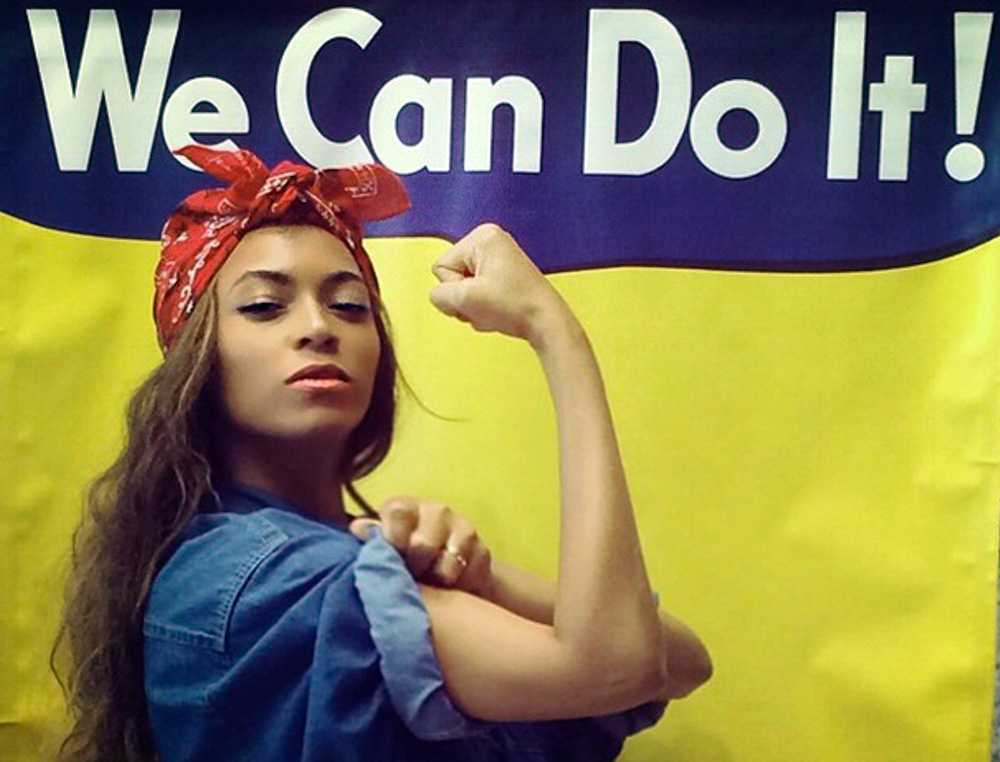Earlier this year, Beyonce dropped a monster of a self-titled album on an unsuspecting world. Critics scrambled to catch up and form an intelligent opinion about what they had limited time to consider. Many reviewers were grasping at clickbait, struggling like television reporters trying to wrap their minds around a sudden uprising or act of war even as they report it. In music-history terms, it was a Bob Dylan move by a woman who is about as impossible to define and understand as the guy who, once upon a time, turned the folk and rock worlds upside down.
The idea that Beyonce can step into Dylan’s shoes—and make them dance—isn’t much of a stretch. After all, Beyonce has been Generation Y’s universal folk hero pretty much since her group Destiny’s Child burst on the scene with the middle-class feminist anthem “Bills Bills Bills” back in 1999. Ever since, middle-class feminism has been a recurring theme in her music, present with as much urgency and command as equality and understanding were in Dylan’s early work, or the recurrence of working-class angst in Bruce Springsteen’s career. In 2011, as conservative leaders geared up for the 2012 election—which gave the world expressions like “binders full of women” and “legitimate rape”—Beyonce dropped “Run the World (Girls)” with a topical precision typically eschewed by pop stars. It wasn’t the first or last time.
Indeed, the persistence of her feminism (“Independent Women,” “Single Ladies,” “Pretty Hurts”) has held her at the fore of contemporary pop music as various versions of Miley and Bieber have come and gone, usually in a haze of drunk tweets and/or tacky racial misappropriation. All the while, Beyonce, with her crazy talent and her purpose, has stood strong. Yet it’s not only those qualities that make her a generational spokesperson—it’s her universality.
In a video on YouTube (see below), Seth Avett sits on a New Orleans soundstage with cellist Joe Kwon. He strums chunky chords on his acoustic guitar—capo on the fourth fret, eyes closed, legs crossed—and leans into a heart-wrenching first verse: “Remember those walls I built?/Well, baby, they’re tumbling down…” If the video’s description didn’t mention the songwriter and title (Beyonce, “Halo”), you might get to the chorus before you realize it’s a tune by an artist who’s about as different from his band, the Avett Brothers, as possible. Avett’s vocals are so plain and everymanlike, it’s shocking to see him climb over the obstacle course of notes that Beyonce’s flawless voice pours out like so much water from a glass. Yet those notes aren’t just showoff vocal gymnastics; they carry emotional weight. Even Avett’s clunky attack can nail that emotion, if he just trusts the pop star’s arrangement. (Thankfully, he does.) As much as navel-gazing acoustic singer/songwriters may aim for this feeling in their compositions, there’s something about what Beyonce does in this song that seems almost more authentic than folksinger authenticity.
Avett is not the first folk or roots artist to seriously tackle this number. Los Angeles-based Americana chanteuse LP toted it around on her last tour, bringing houses down as she nailed the high notes in her trademark vibrato, strumming delicately on her tiny ukulele—an almost comical contrast, if it all didn’t sound so good.
It’s not only “Halo” that translates easily, either. “XO” has a vibe that’s damn near Lumineers-esque, with the crowd sing-along in the background. Except, unlike with the Lumineers, the crowd is singing actual words that mean something—not just space-filling nonsense syllables that give the impression, when belted out in unison, that grander ideas are being expressed. Here again, Beyonce exacts with simplicity a musical feat on which artists from a genre more traditionally considered “simple” have been missing the mark lately.
As with her allegiance to feminist manifestos, Beyonce sets herself apart as an artist above the rest. Call her powerful, savvy, sexy, or flawless; call her a force to be reckoned with. But, behind all the labels the public could place upon her, beyond the magazine covers and airbrushing and endless talking points, Beyonce’s self-titled surprise release was a reminder that, like Dylan, she’s a creative powerhouse who refuses to be pinned down. If she stays true to her driving purpose and that authentic melodic wellspring, her music and its message will live in the modern folk canon for generations. Beyonce With Jay Z. Safeco Field, 1250 First Ave. S., 346-4000, ticketmaster.com. $85 and up. 8 p.m. Wed., July 30.
music@seattleweekly.com




